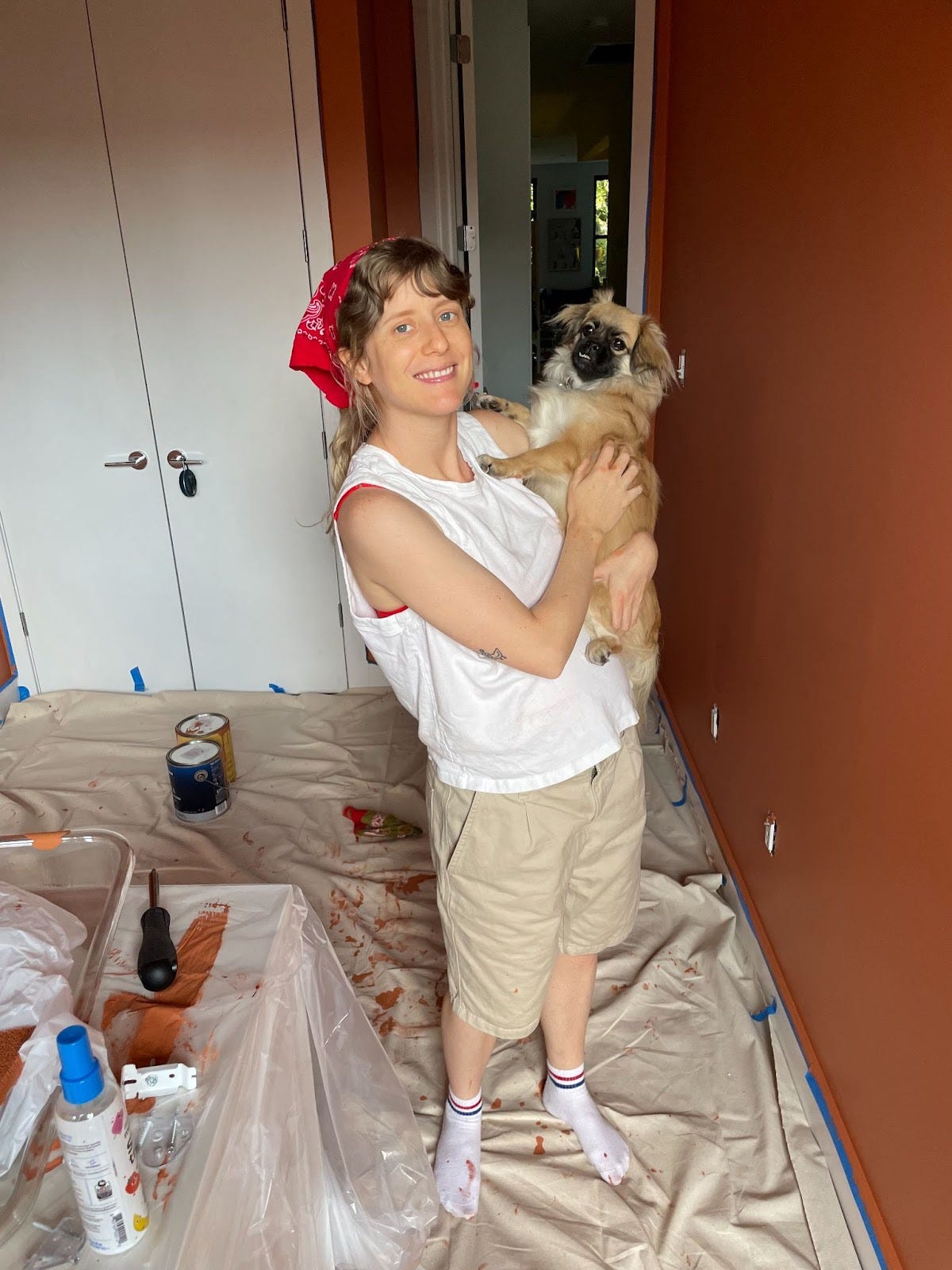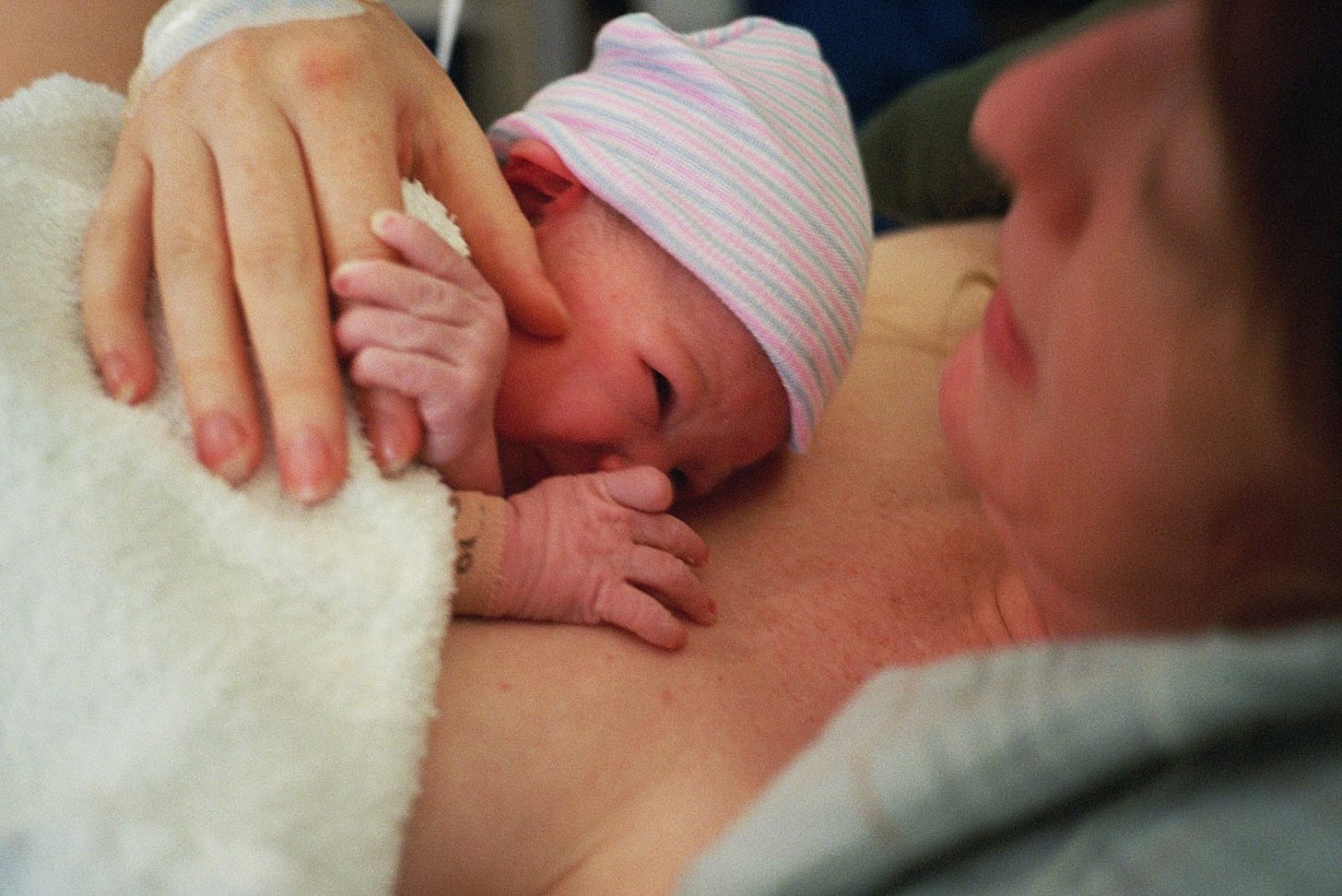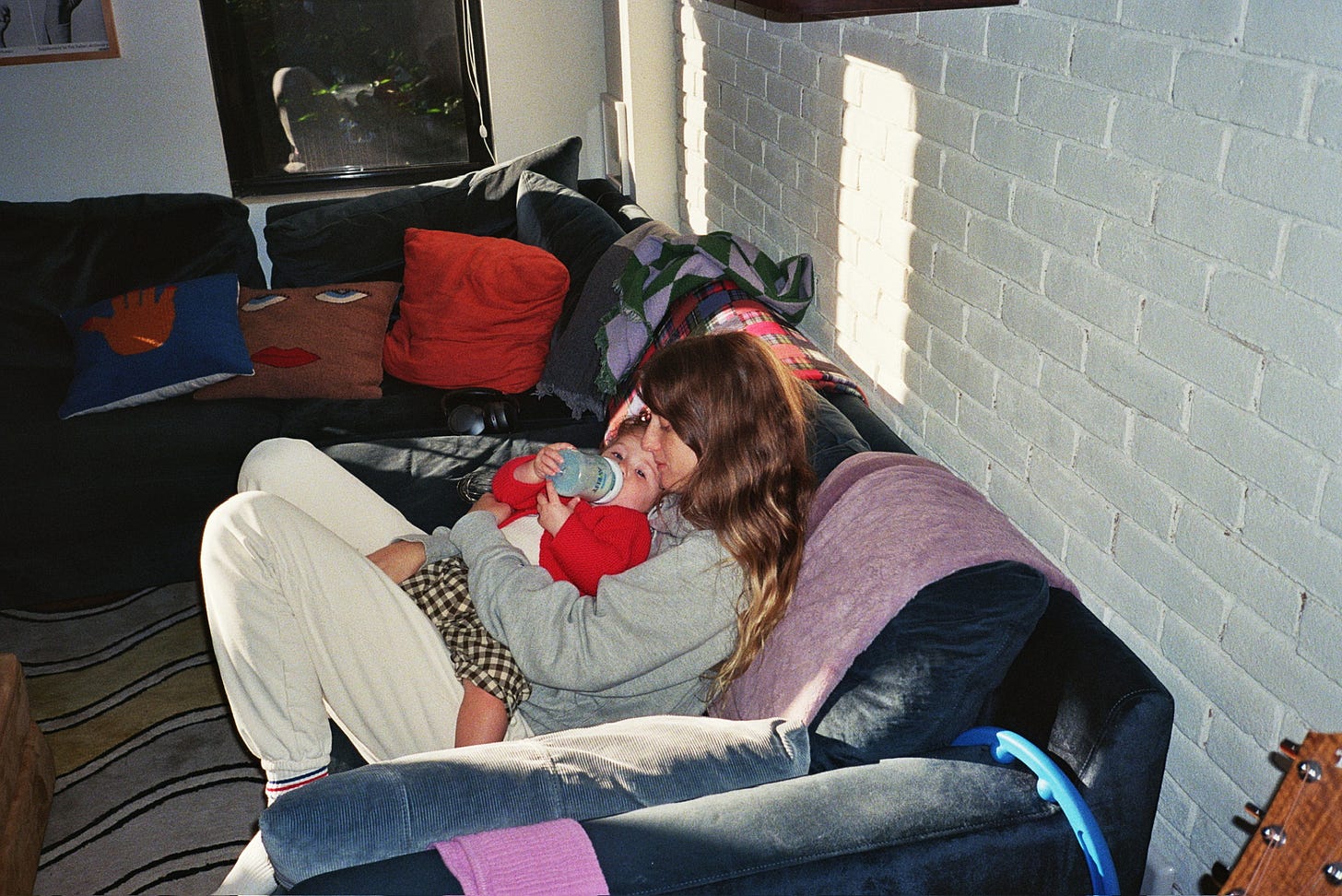#200: Hey from oblivion
The other day I was struck by a visceral memory from last fall, about a month before giving birth: jogging up to a CityMD in the financial district, cold and out of breath, pausing to collect myself before pulling open the door. I was looking for the RSV vaccine. They would tell me they didn’t have it, and so I’d pull out my phone to find the next pharmacy, calling other pharmacies in other boroughs as I hurried down the sidewalk.
RSV is a dangerous virus for newborns that spreads like a cold in the winter, but if you get the shot when you’re pregnant, immunity is said to transfer over. The timing is tricky though—you can only get it between your 32nd and 36th gestational weeks, and my doctor said it was best to have a two-week buffer before covid and flu shots, which need to be administered at least two weeks before birth, which, of course, is not actually a fixed date. This gave me a narrow window—about a week, to be safe—and as every pharmacy told me they didn’t have it, the window was getting narrower.
When the details of that day resurfaced—cheeks pinched with cold, the crisp blue October sky, the breathless drama of the whole endeavor, time running out—it was like remembering a dream. My eyes watered. I’d forgotten I was pregnant. Not practically, obviously, but emotionally, spiritually. Who was that person, running around Manhattan, a live wire of nervous excitement with her 10-foot scroll of to-dos? A relic of the past now. I had the sudden sense that I’d abandoned her, or that she’d abandoned me.

Pregnancy is full of moments like that day—flush with high stakes, alien to you but adopted quickly, made precious through care and research. The experience is a marathon of physical sensation: exploding gut, kicks in the ribs, low thump of your baby’s heart through the doppler, diaphragmatic breathing, heartburn medication, doctor’s paper crinkling under your butt—a spectacle befitting the dramatic transformation unfolding in your head, difficult to comprehend in the present but something you plan to reflect on when it’s all over. At least, that’s what I assumed. Then I had the baby, the stakes skyrocketed, the dramas multiplied, and I rushed ahead, no time to look back or process anything.
Imagine getting struck by lightning, then given a million dollars, then punched in the face, spun around, and shoved into a pile of pillows. After that you might like to take a breath, absorb what’s happened and comprehend its impact, but it’s right then that someone locks you in a room with 10 puppies and says good luck. The whole process of having a child—pregnancy, birth, newborn then baby then toddler care—feels, to me, nearly impenetrable as a reflective subject. I want to pause, consider, take in everything that’s happened and what it’s meant, but it’s moving too fast, happening all the time, and pondering it feels like pondering a painting that’s an inch from my nose.
The RSV memory, however silly and unimportant, appeared to me like a detail on the far edge of the painting I’d forgotten was there. The sudden recognition of its loss a pinhole source of grief. Time is always passing. That’s a fine explanation. It’s just disorienting to lose the thread. This specifically feels like the source of my trouble this past year, not as a mother but as an essayist, as someone who’s constructed a career around reflection. Too much to see, too close to see it. Searching for insight about the wildest transformation I’ve ever undergone, stumbling over and over into cliche: love the baby so much, shocking amount of work, surprisingly fun though, magical also, insane not to get a break, worth it in the end. Everything so true and so boring, at least on paper.
Allow me to air a fear: I’m afraid I’ll have nothing particularly interesting to say about motherhood, or no way of writing about it that is appealing to very many, including me, while simultaneously being completely consumed by it in my day-to-day life. I find this possibility depressing and also threatening. It makes me question who I am and what I’m good at.
I’ve heard we’re all comprised of two selves: the experiencing self and the narrating self. The experiencing self submits always to our circumstances—it feels, needs, desires. The narrating self, meanwhile, is removed—it reflects, rearranges, regales. These modes of being may directly concern a way of living, like being present versus being metacognitive, or looking at a thing versus taking a photo of it. But I think of them as being able to flow into any form of expression: a work of art, a friendship, a style of dress. Even narration itself can split in one direction or the other. Consider a conversation that feels like an experience (spontaneous, vulnerable, close to the bone) versus one that feels like narration (thoughtful, practiced, navigated).
There’s a study from a few years ago about the effects of these two selves on people who’ve had traumatic experiences. Interviewing 78 women, researchers found that those who told their stories from an emotional (experiencing) perspective were more likely to have post-traumatic growth than those who spoke about their experiences from an emotional remove, focused on narrating the facts. Exhibit A: When my husband left I felt distraught, alone, betrayed. Exhibit B: My husband left in June, and I was left to care for the children myself, which was difficult. But the group who showed a higher likelihood of PTG than either of those were the women who were able to find a balance between the two. Exhibit C: When my husband left in June, I was distraught. In time, left to care for the children alone, my sense of betrayal grew. That this also happens to make for the best story is no coincidence. A good story affords a well-rounded sense of comprehension.
The study’s parameters around experiencing and narrating are strict, not exactly how I think of them, but as I read, I kept returning to my memory of giving birth. I’ve told the story enough now—in writing, in therapy, to friends—and yet, one year later, my troubled relationship to it remains unchanged. On Sunny’s birthday last month, I hoped something might break open, but I spent the day dodging my own memories, lost in a confusing swirl of joy and grief, praying for the day to be over so I could stop thinking about it. The memories seemed to want something from me, but I couldn’t tell what. Their presence made me feel sick and afraid. When I truly bring myself back there—not to the details I’ve described before but to the feelings I’ve never been able to express—something in me flinches and I retreat in terror. Like I’m shutting my eyes to avoid a movie’s scariest scene. I instead prefer the version of the story that sticks to the facts, or the one that allows me to share how I felt but at a remove. “That part was awful,” I can say easily, but not really feel it when I do.

My life as a parent seems to come at the storytelling problem differently. The experience crowds out the narration, rather than the other way around. What is there to say about omnipresence? There’s a tactility to parenting (feeding, cleaning, dressing, hugging, rocking, kissing), a primitive quality (love, protection, devotion), that resists intellectualizing. My skill for analysis seems less useful here. Locating the right words used to feel transcendent—invite flashes of self-recognition. But now I find that feeling more often in moments of pure physicality: grabbing fruit out of the fridge while Sunny holds onto my legs, catching myself in the mirror while singing her a lullaby, surprised by my own motherly image. In these moments I feel like I understand myself anew, and yet couldn’t translate that to words if you asked.
When I’m at dinner with friends and I sense the attention is shifting my way, I usually deflect. They want my “update,” but unless they’re also parents (or soon-to-be), interested in the mundane details of child-rearing (as fellow parents always are), I struggle to identify insights they might find interesting. And so I mostly redirect the attention to them—I want to talk about their jobs, their love lives, their families, that event they really need a dress for. I want to talk about culture, or gossip, or whatever stupid thing is happening on the internet. It’s not that I have nothing to say, I’m just not sure what to say about motherhood. This is at complete odds with how passionately I feel about it, how changed I feel by becoming one, how many germs of ideas I jot down in my notes, now languishing on my phone unrealized.
Sometimes I wonder if this resistance I feel to narrating motherhood comes from a protective place. In a recent piece for The Drift, the writer Zoë Hitzig explores what it means to allow intimate aspects of our lives to be constantly mined for insight. Her framing is surveillance capitalism, but I drew comparisons to the insight-mining I do out of habit in my own life. Hitzig suggests that our emphasis on disclosure—everything recorded, captured, shared—means we are “always in the process of codifying experience as information.” This is obviously a limited way to view ourselves. “Some of the most tantalizing and powerful encounters in our lives,” she goes on, “resist the kind of classification that often weighs us down and anchors us in the shallow end of what’s possible.”
Referring to a book by political theorist Lowry Pressly called The Right to Oblivion, Hitzig points to “oblivion” as a realm that ought to be protected from attempts at capture. Oblivion, according to Pressly, “describes a state of affairs about which there is no information or knowledge one way or the other, only ambiguity and potential.” When we tabulate our memories into “neat packets of information,” we risk becoming more fixed to ourselves, less ambiguous. This diminishes our faith in “that central capacity of human agency to change and become different.”
My transition into parenthood has felt like a kind of oblivion. Maybe that’s why the memory of running around downtown looking for a vaccine felt, in the moment I recalled it, almost stunning. How could I ever feel so unfixed? Unknowable to myself, somehow, even as my sense of meaning feels so tangible and close-range? I feel like I’m awaiting something. Some spark, some paradigm shift that finally integrates who I was with who I am, rather than keeping them separate but polite.
I know this creative friction I’m feeling is temporary. If parenting has taught me anything, it’s that everything’s a phase. The fear I mentioned earlier is irrational the way fears always are. Thankfully, I’m old enough now to know that moments of apparent freefall are always moments of transition, that you have to try not to panic; be curious about them instead. The patience required is driving me a little insane, as you’ve maybe gathered, and writing about it always makes me feel like a tedious person. But I’m breathing through it, keeping the faith. As Tilda Swinton said in a recent interview, “The life always comes first.” The work comes out of it.
This is the 200th essay I’ve written for Maybe Baby and my last personal essay of the year (the next two Sundays will be an end-of-year roundup and my advice column). I want to thank you so much for being here. I’ve been through lots of ups and downs with my writing this year and your support has meant so much! I’m very lucky. Next year only ups I’m sure.
Love,
Haley



